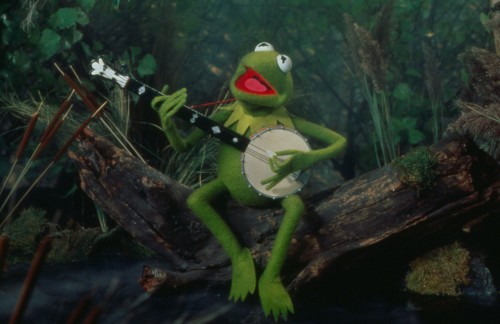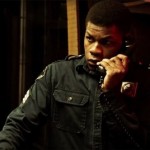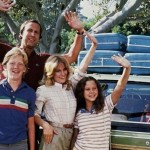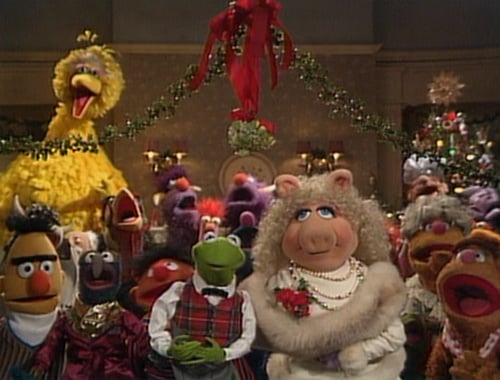I mentioned at the outset that I wasn’t in a great place when I sat down to watch The Muppet Movie. I was turning 30 with nothing to show for it but a cheap apartment and a job that I believed meant I had sold out. My parents had me in their early twenties, which means I watched them turn 30. I remembered the “Over the Hill” balloons and jokes about impending death. For me, 30 was symbolic of being an official grown up. Here I was, approaching that age and it looked like all life was going to be about was soldiering through a shitty job to keep debt collectors at bay. I’d struggled with cynicism all my life, but at this point I was starting to lose the battle.
But the thing about the Muppets is that (horrible ABC sitcom notwithstanding) world-weariness and cynicism are against their ethos. As I listened to the songs and laughed at the jokes, I was also moved by the movie’s sincerity. Despite the whole “rich and famous contract,” Kermit’s not driven by greed; he believes that making millions of people happy is a noble goal. He finds a family of weirdos with the same dream, which only gets fuller the more people it includes; he even tries to get Doc Hopper to see things from his perspective. Despite the Muppets’ love for silliness, the movie ends with a celebration of hard but fulfilling work. The joyous “Magic Store” finale showcases every character on a soundstage with a role to play in making The Muppet Movie come to life. The Muppets may specialize in holy nonsense, but they’re also evangelistic about fellowship and passion. In Henson’s world, entertainment and creativity are things worth celebrating, and they’re even more worthwhile when they’re done communally. There’s no room for cynicism in that worldview.
If “The Rainbow Connection” was my Ratatouille moment, “The Magic Store” was my Grinch one. Watching these characters chase their dream together with joy and sincerity stirred something in me. When Kermit sang “I’ve heard it too many times to ignore it; it’s something that I’m supposed to be,” something in me returned to life. I felt a desire to write again. I felt compelled to share my passion with others. I wanted to call up friends just to laugh together. I made plans that on a long road trip with my sister and nephew a few weeks later, we would watch this movie together. My heart felt full for the first time in months. I was no longer ashamed to be watching a kids’ movie; instead, I was reminded of C.S. Lewis’ admonition, “When I became a man I put away childish things, including the fear of childishness and the desire to be very grown up.”
After the film ended, I delved further into Jim Henson’s story. I found that there’s a sense in which The Muppet Movie is more than just silliness and inspired nonsense. Writers Jack Burns and Jerry Juhl structured Kermit’s journey as a mirror of Henson’s. He left Mississippi and eventually broke free of the creative constrictions of the advertising world on his quest to make millions of people happy (he also ended up becoming rich and famous, of course). Along the way, he took up with a team of weirdos including Frank Oz, Juhl, Burns, and others. Without them, the particular chemistry of anarchy and sincerity that make the Muppets so special can’t be replicated ⸺ even with a clever script from Jason Segel. Henson was a genius and a force for good in the world. But he also was a skilled collaborator, and the communal joy I mentioned earlier is apparent in nearly every project he and his colleagues worked on in the 70s and 80s.
The final lines of the movie stuck with me. Indeed, today I have a plaque hanging up in my office bearing them alongside a drawing of Henson’s famous frog. As the “Rainbow Connection” reprise fades out and Muppet chaos causes the fake soundstage settings to give way to a rainbow that bursts in through the roof, suddenly every Muppet character fills the screen. Front and center, of course, is Kermit, now staring directly at the audience. “Life’s like a movie, write your own ending,” he sings. “Keep believing, keep pretending.” I burst into tears at that moment, feeling as if the DVD somehow was delivering a personal message. I suddenly felt that my thirties might not be a time of dashed dreams but of rekindled passions.
I didn’t know then if I would ever be able to write about things I loved for a living full time. To be honest, eight years later, I still don’t. But I resolved to double down on my attempts, to celebrate artistry and enjoy the process, even if they didn’t always give way to tangible results. I vowed to run from cynicism and fight despair, focus on ways to create and celebrate good things and bring joy to others. I wanted to approach my work as if no dream was too lofty and build relationships with those who shared the same aspirations.
Cynicism is still a fight, and it’s still hard to feel like my creative work is reaching as many as I sometimes would like. That’s why I regularly pull out The Muppet Movie (since upgraded to a Blu-Ray) and remind myself of the joy, hope, and passion that Henson and his collaborators championed. It’s a reminder that it’s okay to laugh, that making people smile is a worthwhile goal, and that the journey is not worth taking without some friends alongside you.
But there’s a new dimension to my love for The Muppet Movie. Now I watch it alongside my 5-year-old son and 1-year-old daughter. I let them revel in the Muppets’ holy nonsense, and I hope that the lessons of community, creativity, and dreaming rub off on them. We’ve turned “The Rainbow Connection” into a lullaby…and if the song made me cry as a 29-year-old alone on my couch, imagine how much it made me blubber when it came on my iPod recently and my son sang along. Sometimes, as they go to sleep, I whisper that final line, hoping it finds its way into their dreams, passing on Henson’s hopefulness:
Life’s like a movie, write your own ending. Keep believing, keep pretending.













